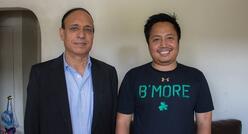
Arif Khazan knows better than anyone how difficult, stressful, and time-consuming integration into a new culture can be. Newly arrived refugees can find it arduous managing day-to-day activities and understanding American values and culture. Arif himself came here as a refugee, and went through the same difficult adjustment. For this reason, he decided to show the ropes to a new refugee through the IRC’s Mentor Programme.
In his home country, Arif was a prominent member of the Writer’s Association of Afghanistan, a prestigious platform for historians, poets, and intellectuals to discuss literary trends and express their views on contemporary issues. In the early 1980’s, the Soviet Army invaded Afghanistan and established a tyrannical, communist government. After a decade of strong opposition by the Mujahideen, supported and funded by several nations such as the United States and Saudi Arabia, the Soviet troops left Afghanistan, but civil war continued. The Soviet-backed regime leaders remained and the Mujahideen pushed to overthrow the regime. Arif said, “This was a dangerous time for everyone, especially for those in my profession as a writer of contemporary issues, but I was never truly a target because I did not own a weapon.” In 1992, the communist government was destroyed and the Taliban seized control of the capital, Kabul. They introduced an extremist version of Islam, establishing radical laws enforced by violent and severe punishments. Arif escaped to Pakistan, where within the next few years the Taliban also took over. He was not safe there, as he frequently received death threats from Muslim radicals, so Arif fled to Uzbekistan in 1996 on a three-month work visa.
After those three months, he took a train to work in Moscow, where he became editor-in-chief of a cultural magazine highlighting literature, poetry, and short stories. He also held a government position as a radio newscaster and taught children at an Afghan academic centre. Although Arif secured respected jobs in Moscow, he says, “many foreigners living and working in Moscow were subject to violent discrimination from both the Soviet police force and young Soviet radicals. Every day, the police would approach us and ask for our citizenship documents which we did not possess.” Each time, after being unable to produce identification, the officers would search his pockets and take any cash he had. In addition to these unwarranted police raids, Soviet extremists often physically attacked foreigners. Arif had nowhere else to go; Afghanistan and Pakistan were still ravaged by civil war and the USSR was quickly becoming too dangerous.
On July 10, 2006, Arif applied as a refugee through the UNHCR and moved to the United States. His skills have landed him many jobs the past decade: a language teacher of American government employees, a translator at Mobius Industries, and a local Army radio broadcaster.
Wanting to help out, Arif applied to be a volunteer mentor with the IRC. Arif was matched with Tin, a refugee from Myanmar (also known as Burma), where minority groups are facing strong persecution and are forced out of the country. Integration was especially difficult for Tin because in Myanmar he lost his leg in an accident working as a truck driver. He also knew no English upon arrival. Lack of mobility and the language barrier complicated the process, but Arif was a perfect match for Tin, considering his extensive language teaching experience. Arif explains, “Because he did not know English and I did not know Burmese, we started out language training with simple ABC’s and vocabulary of objects in the room. I would point to the table and say ‘table,’ and have him repeat it until his pronunciation was good. From there, we moved to small sentences like ‘this is a table’ and ‘that is a chair.’”
Arif visited his Tin once a week, teaching him English and also helping with community integration activities such as acquiring a library card, renting books and DVDs to help with English, going to the bank, and navigating the grocery store. One would expect differences in Afghan and Burmese cultures that would complicate the relationship between Arif and his mentee, but Arif states there were no difficulties in that regard. He says, “I am very friendly and understanding; we get along very well.” The mentor programme only requires six months of participation, but two years later, Arif still visits his mentee about once a month. The IRC Mentoring Programme is integral to the refugees’ adjustment to their new lives in the United States; it provides the immediate, vital assistance and also fosters friendships that will last a lifetime.